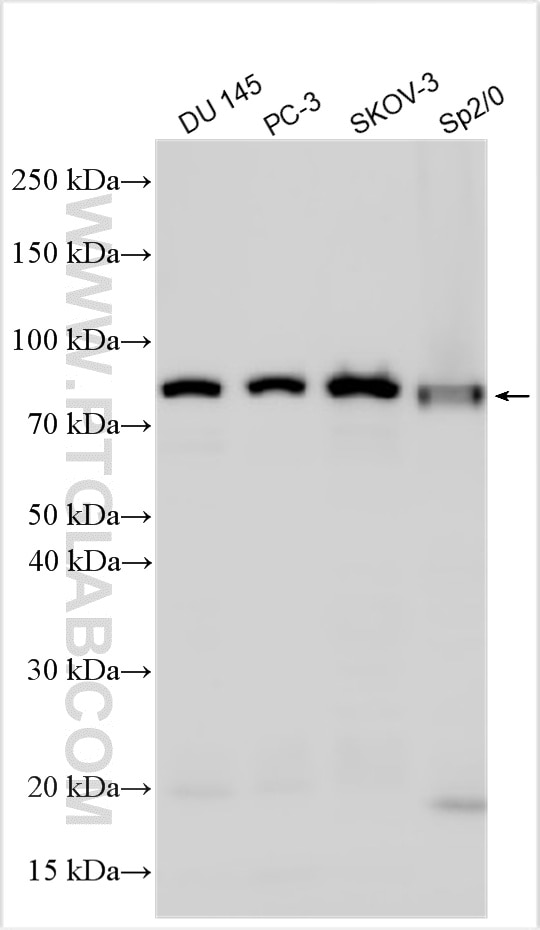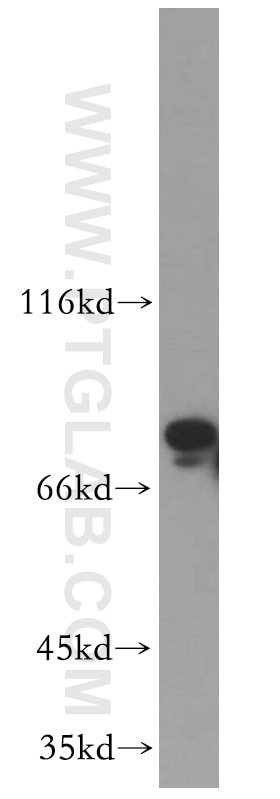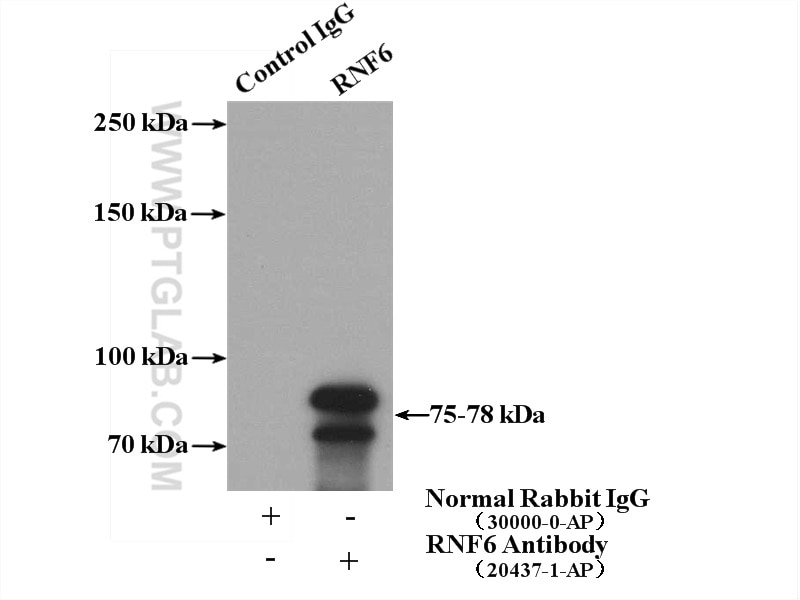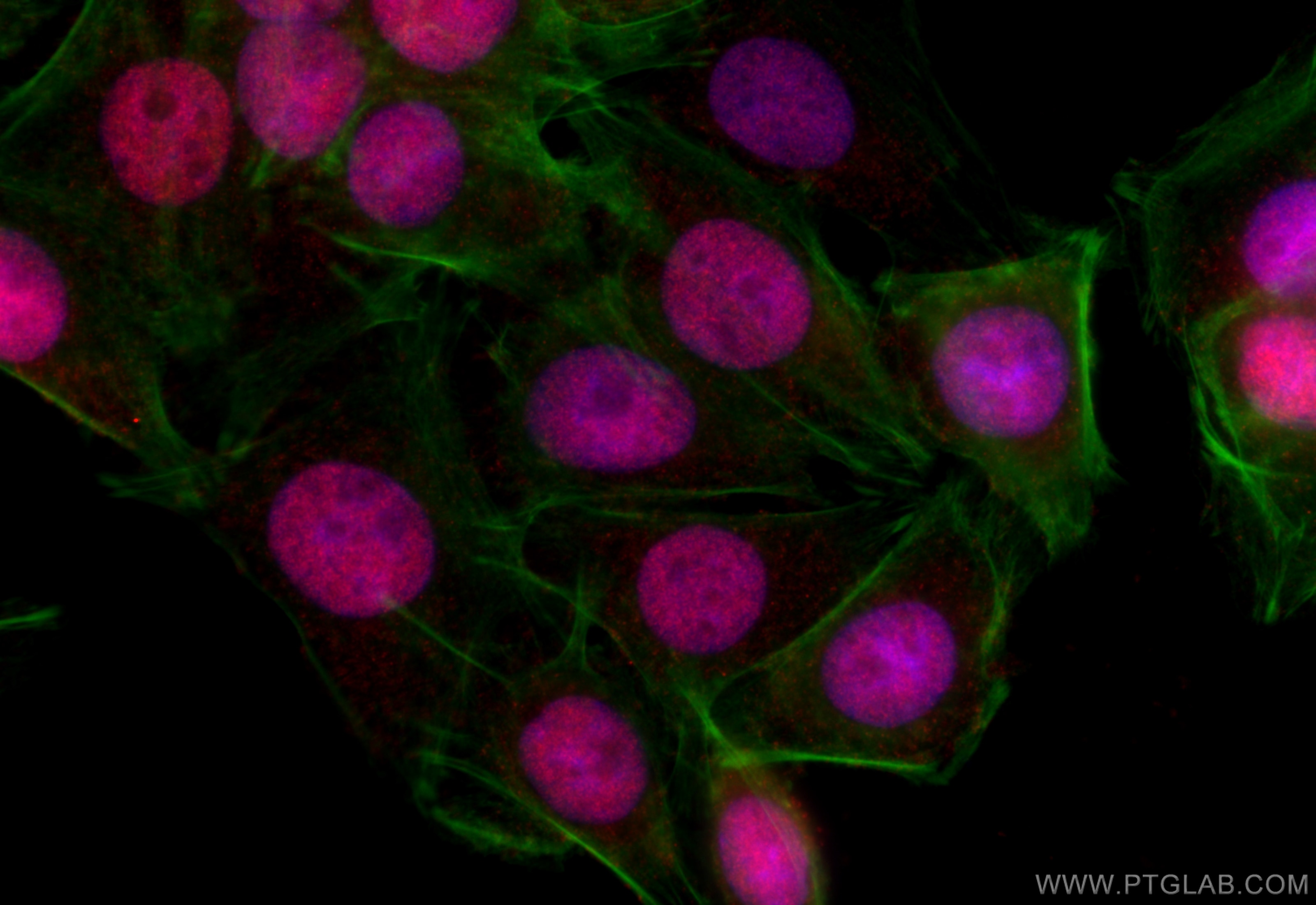- Featured Product
- KD/KO Validated
RNF6 Polyklonaler Antikörper
RNF6 Polyklonal Antikörper für WB, IF/ICC, IP, ELISA
Wirt / Isotyp
Kaninchen / IgG
Getestete Reaktivität
human, Maus
Anwendung
WB, IHC, IF/ICC, IP, ChIP, ELISA
Konjugation
Unkonjugiert
Kat-Nr. : 20437-1-AP
Synonyme
Geprüfte Anwendungen
| Erfolgreiche Detektion in WB | DU 145-Zellen, Maushodengewebe, PC-3-Zellen, SKOV-3-Zellen, Sp2/0-Zellen |
| Erfolgreiche IP | Maushodengewebe |
| Erfolgreiche Detektion in IF/ICC | SW480-Zellen |
Empfohlene Verdünnung
| Anwendung | Verdünnung |
|---|---|
| Western Blot (WB) | WB : 1:1000-1:6000 |
| Immunpräzipitation (IP) | IP : 0.5-4.0 ug for 1.0-3.0 mg of total protein lysate |
| Immunfluoreszenz (IF)/ICC | IF/ICC : 1:50-1:500 |
| It is recommended that this reagent should be titrated in each testing system to obtain optimal results. | |
| Sample-dependent, check data in validation data gallery | |
Veröffentlichte Anwendungen
| KD/KO | See 1 publications below |
| WB | See 6 publications below |
| IHC | See 2 publications below |
| IF | See 1 publications below |
| IP | See 1 publications below |
| ChIP | See 1 publications below |
Produktinformation
20437-1-AP bindet in WB, IHC, IF/ICC, IP, ChIP, ELISA RNF6 und zeigt Reaktivität mit human, Maus
| Getestete Reaktivität | human, Maus |
| In Publikationen genannte Reaktivität | human, Maus |
| Wirt / Isotyp | Kaninchen / IgG |
| Klonalität | Polyklonal |
| Typ | Antikörper |
| Immunogen | RNF6 fusion protein Ag14209 |
| Vollständiger Name | ring finger protein (C3H2C3 type) 6 |
| Berechnetes Molekulargewicht | 685 aa, 78 kDa |
| Beobachtetes Molekulargewicht | 78 kDa |
| GenBank-Zugangsnummer | BC034688 |
| Gene symbol | RNF6 |
| Gene ID (NCBI) | 6049 |
| Konjugation | Unkonjugiert |
| Form | Liquid |
| Reinigungsmethode | Antigen-Affinitätsreinigung |
| Lagerungspuffer | PBS with 0.02% sodium azide and 50% glycerol |
| Lagerungsbedingungen | Bei -20°C lagern. Nach dem Versand ein Jahr lang stabil Aliquotieren ist bei -20oC Lagerung nicht notwendig. 20ul Größen enthalten 0,1% BSA. |
Hintergrundinformationen
RNF6 was firstly cloned in a genetic study of chromosomal rearrangements in myeloproliferative disorders, mapping to chromosome 13q12.12 [PMID:10331950]. It containing a coiled-coil domain at the N-terminus, and a RING-H2 finger at the C-terminus which is responsible for its ubiquitin ligase activity. It also activate Inha gene expression by participating in a protein complex binding to the promoter region [PMID:11971979]. In addition, LIMK1 is a substrate of RNF6 and the RNF6-induced LIMK1 polyubiquitination is mediated via K48 of ubiquitin and leads to proteasomal degradation of the kinase [PMID:16204183].
Protokolle
| PRODUKTSPEZIFISCHE PROTOKOLLE | |
|---|---|
| WB protocol for RNF6 antibody 20437-1-AP | Protokoll herunterladen |
| IF protocol for RNF6 antibody 20437-1-AP | Protokoll herunterladen |
| IP protocol for RNF6 antibody 20437-1-AP | Protokoll herunterladen |
| STANDARD-PROTOKOLLE | |
|---|---|
| Klicken Sie hier, um unsere Standardprotokolle anzuzeigen |
Publikationen
| Species | Application | Title |
|---|---|---|
Oncogene RING-finger protein 6 promotes colorectal tumorigenesis by transcriptionally activating SF3B2.
| ||
Cancer Lett Ring finger protein 6 enhances chemo-resistance by transcriptionally activating proliferating cell nuclear antigen expression and attenuating DNA damage in lung adenocarcinoma. | ||
Acta Pharmacol Sin RNF6 promotes myeloma cell proliferation and survival by inducing glucocorticoid receptor polyubiquitination. | ||
Anticancer Drugs miR-203a suppresses cell proliferation by targeting RING-finger protein 6 in colorectal cancer. | ||
J Biol Chem Induction of zinc finger protein RNF6 auto-ubiquitination for the treatment of myeloma and chronic myeloid leukemia | ||
Int J Biol Sci TRIM26 promotes non-small cell lung cancer survival by inducing PBX1 degradation |





